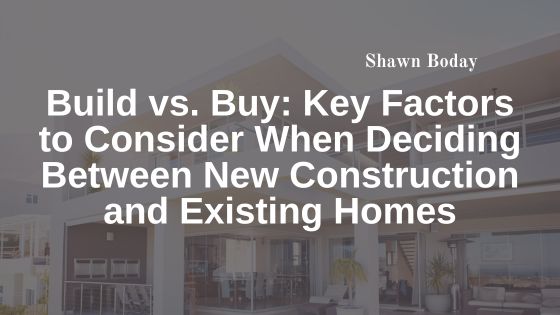One of the biggest decisions homebuyers face is whether to build a new home from the ground up or purchase an existing property. Each option comes with unique benefits, challenges, and financial implications. The right choice depends on your priorities, lifestyle, and long-term goals. Here’s a breakdown of the key factors to consider when deciding between building and buying a home.
1. Cost and Budget
Buying an existing home often comes with a lower upfront cost. You’ll have a clearer picture of what you’re paying for, and you may even have room to negotiate based on the home’s condition or time on the market. Plus, you can move in quickly, avoiding the cost of temporary housing or construction delays.
Building a home, however, can be more expensive—especially if you opt for custom features, premium materials, or an in-demand location. Costs can also fluctuate due to labor shortages, material price hikes, or weather-related delays. On the flip side, new homes may come with lower maintenance costs in the short term and modern energy-efficient systems that save money over time.
2. Customization and Personalization
If having a home tailored to your exact preferences is a priority, building may be the best choice. From layout and finishes to energy systems and smart technology, custom homes offer a high level of personalization. You’re able to create a space that truly reflects your lifestyle.
Existing homes, while more limited in customization, may still offer the chance for renovation. However, changing structural elements or systems in an older home can be costly and time-consuming.
3. Location and Lot Availability
Buying an existing home gives you access to established neighborhoods—often with mature landscaping, schools, parks, and nearby amenities. You may find that your desired location only has resale homes available, especially in urban or historic areas.
Building a home often requires finding an available lot, which may be in newer or more remote communities. This could mean longer commutes or fewer nearby services, depending on your region.
4. Timeline and Move-In Readiness
One of the biggest advantages of buying an existing home is speed. Once the paperwork is complete, you can move in almost immediately. Building a home takes time—often several months—and construction delays are common.
If your timeline is tight or you’re relocating for work or family, buying may be the more practical route.
5. Maintenance and Efficiency
New construction homes typically feature modern building codes, energy-efficient appliances, and up-to-date wiring and plumbing. You’re less likely to face major repairs in the first few years.
Older homes might require more maintenance or updates to meet current standards. However, with the right inspections and budgeting, many buyers see value in a well-built, character-filled existing home.
Final Thoughts
Both building and buying have their merits. If you want a move-in-ready home in a prime location and a faster timeline, buying may suit you best. If you’re looking for customization, long-term savings on energy and maintenance, and a brand-new feel, building could be the way to go.
Ultimately, the right decision depends on your personal preferences, financial situation, and lifestyle needs. Consulting with a real estate professional or builder can help you make the most informed choice.

